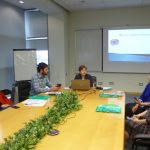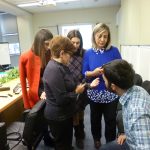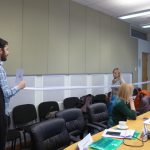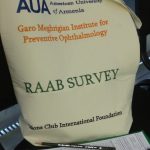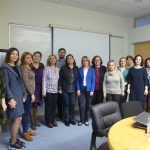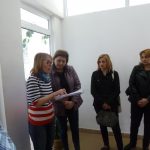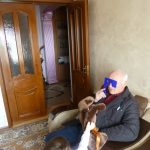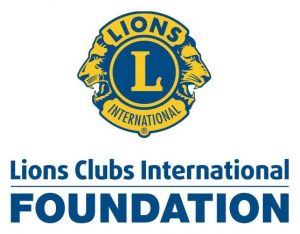 YEREVAN, Armenia – In April, 2019, the Garo Meghrigian Institute for Preventive Ophthalmology (Meghrigian Institute) of the Avedisian Onanian Center for Health Services Research and Development (CHSR), Turpanjian School of Public Health (SPH), conducted a three-day training on Rapid Assessment of Avoidable Blindness (RAAB) and a two-day training on Improvement of Ophthalmology Qualifications. The trainings were held at the American University of Armenia (AUA) and participants were granted Continuous Professional Development (CPD) credits.
YEREVAN, Armenia – In April, 2019, the Garo Meghrigian Institute for Preventive Ophthalmology (Meghrigian Institute) of the Avedisian Onanian Center for Health Services Research and Development (CHSR), Turpanjian School of Public Health (SPH), conducted a three-day training on Rapid Assessment of Avoidable Blindness (RAAB) and a two-day training on Improvement of Ophthalmology Qualifications. The trainings were held at the American University of Armenia (AUA) and participants were granted Continuous Professional Development (CPD) credits.
The trainings were developed and organized in the scope of the project “Nationwide Epidemiological Survey Using Rapid Assessment of Avoidable Blindness (RAAB) Methodology,” which is made possible by the financial support from the Lions Club International Foundation (LCIF). The main goals of the project are to estimate the prevalence of ocular morbidity and its potential causes and vision loss due to cataracts and other major causes among population aged 50 and over in the Republic of Armenia, as well as to evaluate the effectiveness of the innovative public health approach implemented in Gegharkunik province of Armenia between 2003 and 2018 in reducing cataract related ocular morbidity and vision loss, an intervention supported by a LCIF-SightFirst grant in 2003-2008.
The RAAB is a rapid methodology to conduct a population-based survey of blindness/visual impairment and eye care services among people aged 50 years and over. It is intended to identify the prevalence of blindness and visual impairment, its main causes, the output and quality of eye care services, barriers, cataract surgical coverage, and other indicators of eye care services in a specific geographic area. The RAAB in Armenia will cover all provinces of the country including a sample of almost 3,500 people. The survey teams include trained ophthalmologists, nurses, and interviewers.
The RAAB training has been implemented to thoroughly train RAAB survey team members so that they uniformly follow the same procedure to identify eligible subjects, assess visual acuity through E charts,a pinhole, and examine the eye lens, as well as record data. Each team received standardized instructions on definitions of eye disease, methods of selection of the subjects, examination protocol, and methods of obtaining and recording data. Dr. Ala Paduka, a certified RAAB trainer, conducted the training in collaboration with Dr. Naira Khachatryan, the principal investigator of the project. Five ophthalmologists, three nurses, and four interviewers participated in the training.
After successfully completing the theoretical part of the RAAB training, the teams put their knowledge into practice. Each team practiced visual acuity testing on each other, using the E chart and a pinhole. Then, the teams traveled to Lions Regional Ophthalmic Unit (LROU) in Sevan to conduct eye examinations among 40 patients to assess inter-observer variation. The findings of each examiner were compared with the findings of the most experienced examiner. The most complicated cases (fourteen patients) were invited to the LROU for a follow-up. Each team discussed the eye examination results of those cases with Dr. Gevorg Baraghamyan, the Head Physician and Ophthalmic Surgeon of LROU in Sevan. The teams pre-tested door-to-door eye examinations among people living in Sevan, Gegharkunik province. The pretesting was conducted under the supervision of Drs. Paduka and Khachatryan, and Aida Giloyan, the senior researcher and operations manager of the Meghrigian Institute.
The Ministry of Health of the Republic of Armenia (RA) accredited the curricula of both trainings and designated 14 theoretical and 7 practical CPD credits for the ophthalmologists and 13 theoretical and 5 practical CPD credits for the nurses participating in the RAAB training, as well as 6 theoretical and 3 practical CPD credits for the ophthalmologists participating in the second training. All the participants will receive certificates in recognition of successful completion of the training courses and credits signed by the RA Minister of Health.
The AUA School of Public Health works actively to improve population health and health services in Armenia and the region through interdisciplinary education and development of public health professionals to be leaders in public health, health services research and evaluation, and health care delivery and management.

